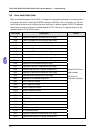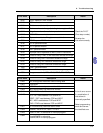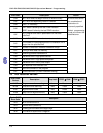
6. Troubleshooting
6-3
Symptom Troubleshooting and Corrective Actions
Diagnosing Input
Malfunction
When input indicator LEDs are OFF,
1. Check the wiring of the input devices.
2. Check that the power is properly supplied to the input terminals.
3. If the power is properly supplied to the input terminal, there is
probably an abnormality in the PLC’s input circuit. Please contact
your dealer.
4. If the power is not properly supplied to the input terminal, there is
probably an abnormality in the input device or input power supply.
Check the input device and input power supply.
When input indicator LEDs are ON,
1. Monitor the input condition using a programming tool. If the input
monitored is OFF, there is probably an abnormality in the
PLC’s input circuit. Please contact your dealer.
2. If the input monitored is ON, check the program again. Also, check
the leakage current at the input devices (e.g., two-wire sensor) and
check for the duplicated use of output or the program flow when a
control instruction such as MC or CJ is used.
3. Check the settings of the I/O allocation.
Diagnosing Output
Malfunction
When output indicator LEDs are ON,
1. Check the wiring of the loads.
2. Check if the power is properly supplied to the loads.
3. If the power is properly supplied to the load, there is probably an
abnormality in the load. Check the load again.
4. If the power is not supplied to the load, there is probably an
abnormality in the PLC’s output circuit. Pleas contact your dealer.
When output indicator LEDs are OFF,
1. Monitor the output condition using a programming tool. If the output
monitored is turned ON, there is probably a duplicated output error.
2. Forcing ON the output using a programming tool. If the output
indicator LED is turned ON, go to input condition check. If the output
LED remains OFF, there is probably an abnormality in the PLC’s
output circuit. Please contact your dealer.


















